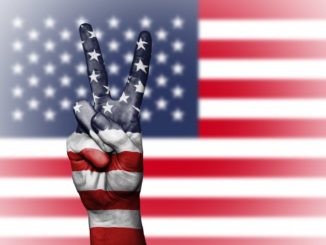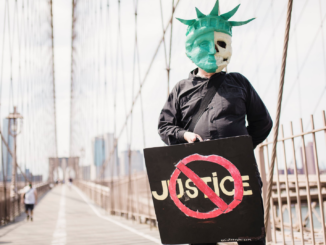Editor’s note: This article was submitted for publication Fall 2018. This is a late upload.
By: Rev. David Wilson Rogers
Once again Colin Kaepernick is making headlines and blowing up throughout social media. Only this time, it is the giant sports fashion company Nike that is shouldering the brunt of the firestorm of controversy. Nike and Kaepernick went public over the weekend announcing a new ad campaign for Nike that features the former NFL Quarterback.
According to the Wall Street Journal, the immediate backlash hit Nike in the stock market on the first day of trading since the announcement went public with a 3.16 percent drop in stock value. In addition, social media erupted with calls for boycotts of Nike products and images of people setting Nike merchandise on fire.
The advertising in question features Kaepernick as one who is willing to stand up for what he believes even if it means sacrificing everything, followed by the long-running slogan of Nike, “Just do it!” The ad refers to Kaepernick’s controversial decision to kneel at NFL football games during the National Anthem in silent protest over police brutality and violence against African Americans at the hand of police. In response, many more NFL players chose to take a knee in protest, while many others cried foul, suggesting the protest was disrespectful of the flag, the National Anthem, and veterans. First as a candidate, and later as President, Donald Trump also weighed in on the issue suggesting that Kaepernick and all others kneeling be fired for disrespect. Subsequently, Kaepernick is no longer working for the NFL.
In spite of the initial stock loss, the long-reaching effect of the advertising campaign may have more to do with demographics than political controversy. According to the Wall Street Journal, the coveted demographic of Nike, adults ranging in age from 18 to 34, consider Kaepernick’s protest to be legitimate and view it favorably. This is in contrast to largely unfavorable opinion of all Americans and only 10 percent favorability by Republicans, WSJ reports.
Nike and the current advertising campaign aside, what is perhaps most notable is how a simple, silent, and legal protest against police brutality has morphed into a dynamic symbol of national pride and respect. Although clearly fueled by the remarks of President Trump, it is arguable that the real fuel behind the shift in meaning lies in the ubiquitous power of social media to create and transform meaning.
In these contentious and politically divisive times, symbols of nationalism and tribal unity seem to take on far more relevance than perhaps in years past. Whether this a good thing or a bad thing largely depends on where one may fall on the political spectrum. It is, however, a movement that has taken on a life of its own.
Some argue that as Americans, common unity and allegiance to the America Flag is essential for national identity and patriotism. Additionally, many believe that veterans who have fought, and often died, defending the flag are disgraced when the flag is disgraced by one’s deliberate failure to render customary honors.
Another factor fueling the spirited debates is the perception of a long-standing association the NFL has with public displays of patriotic fever and devotion. According to PolitiFact, the playing of the National Anthem has often accompanied sporting events since the Second World War, but in the NFL it was not emphasized until after the 9/11 terrorist attacks. Even then, the players were often kept in the locker room until after the Anthem. Subsequent to the terrorist attacks and US military involvement in Iraq and Afghanistan, patriotism and national pride became strong marketing points for the league—including the televised renderings of the Anthem.
Given the strong ties between football and patriotism, it is recognizable that many would become offended at the practice of kneeling during a moment of national pride and unity. Yet, many also argue that the flag stands for liberty, not obligatory honors. Likewise, while the flag may serve as a national symbol, no member of the Armed Forces truly defends a flag. Rather, as the oath taken clearly states, they are to “protect and defend the Constitution of the United States,” which includes the right to free speech and peaceful protest. Therefore, many argue, exercising one’s rights actually honors the sacrifices made by veterans.
Ultimately, it is difficult to predict how history will judge these perilous times. Yet, as educated Americans, perhaps it is our better cause to rise above the controversy and recognize that we have far greater problems than how one renders—or chooses to not render—honor to the flag.
Kaepernick’s original call for justice and an end to police brutality remains a problem in many parts of this nation—a problem that will not be resolved by forcing one to render customary honors to the flag. In large part, by allowing social media and political figures to redefine the meaning, it has only exacerbated the problem and undermined the credibility of both sides. The legitimate discontent of men and women who are treated unjustly by the system have been demonized as less than truly American in their protests and those who cry with patriotic fervor for freedom and liberty have unwittingly demanded a restriction to both.
As long as the debate remains over rendering honors or protesting, nothing will be solved. It is time that Americans stop focusing on ceremonial distractions and address the real problems at hand. The flag will not save us, but arguing over it may very well destroy us. After all, it is the Constitution that truly binds this nation and not a red, white, and blue piece of cloth.



